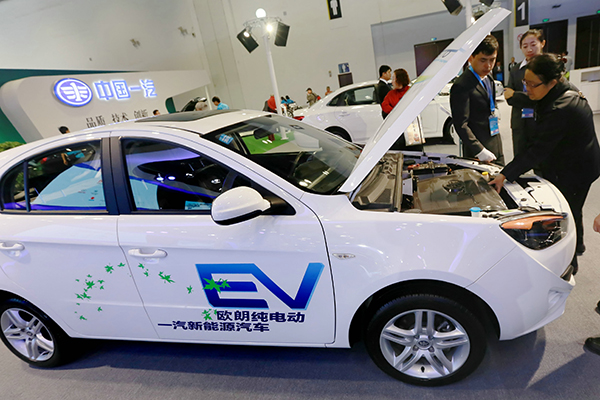 |
|
Visitors examine a pure electric car at an auto exhibition in Beijing late last year. [Photo provided to China Daily] |
Rapid pace of production and sales is lowering demand for quality, head of nonprofit claims
A senior auto expert called for China's fast-growing new-energy vehicle industry to decelerate, a rare move amid the government's campaign to stimulate the sector nationwide.
"The growth should slow down a bit and the market should stay reasonable," said Chen Qingtai, head of the China EV 100 Association, a major nonprofit organization dedicated to promoting the sector's development, at a forum in Xi'ning, capital of Qinghai province, on June 20.
New-energy vehicles are being developed at a rapid pace in China due to favorable government policies and the government's overarching goal of having 5 million such cars on the nation's roads by 2020.
China sold 126,000 NEVs, including pure electric ones and plug-in hybrids, through the first five months of this year, a 134 percent surge year-on-year, according to the China Association of Automobile Manufacturers.
The growth rate was higher in 2015, during which 331,092 electric cars and plug-in hybrids were sold, 3.4 times the number from the previous year.
Chen said many automakers are so busy producing and selling NEVs that they are lowering the demand for quality and slowing down research and development.
"The phenomenon is worrying and dangerous. If there are terrible accidents, the whole industry will suffer."
He urged automakers not to be misled by soaring sales figures because they are the result of government subsidies and do not reflect real market demand.
A recent poll by the Auto Business Review magazine of more than 700 new-energy car owners in China reveals that some 80 percent made the purchase because the license plates for such cars are easier to obtain. The exemption from rules that limit gas-powered cars from roads one day a week is also a major factor in the purchase of NEVs.
Chen warned, "When the government stops its financial stimuli, the sector will go back to its starting point.
"What decides the future of electric cars is not production capacity but technical breakthroughs. They are what electric cars can rely on to compete with gasoline vehicles."
Financial incentives have been offered since 2010, with the subsidy for each electric car sold reaching up to 100,000 yuan ($15,280) this year.
But the government has been cutting subsidies year by year and plans to stop them altogether by 2020.
"So we should allow problems to emerge in the current stage, increase research and development efforts, and solve those problems, so that we can better brace for the arrival of the new-energy vehicle era."
Among others, Chen called for more research and development on batteries as mileage anxiety and safety are among the top concerns that dissuade potential customers, and a shortage of breakthroughs in battery capacity is making electric cars less affordable.
The Auto Business Review poll shows 64 percent of problems respondents experience are related to batteries and 18 percent to electric motors.
Two new-energy vehicles, one from BYD and another from SAIC Motor, caught on fire in June due to alleged charging problems, according to Chinese reports.
"In a sense, batteries will make or break the new-energy vehicle industry," said Chen.
